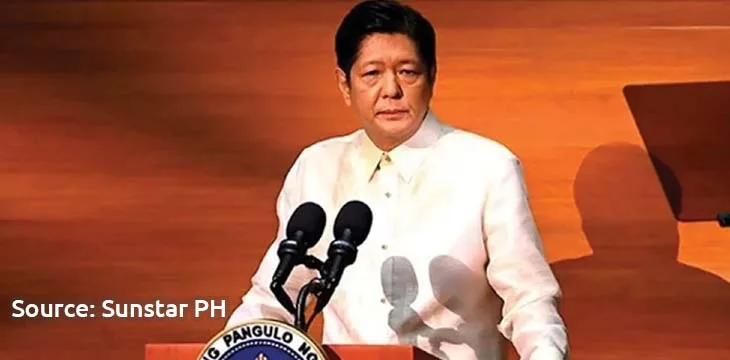|
Getting your Trinity Audio player ready...
|
The Philippines must foster a culture of innovation, hand-in glove with a culture of entrepreneurship, according to President Ferdinand “Bongbong” Marcos Jr. He presented the concept as “Filipinnovation” during his second State of the Nation address to Congress this week, adding that science and technology, especially R&D, lies at its foundation.
Blockchain R&D firm nChain has established a presence in the Philippines and is working hard to ensure that industry groups and government officials understand the technology’s advantages. nChain representatives, including Executive Chairman Stefan Matthews, have met personally with President Marcos, and the company has partnered with the provincial government in Bataan to develop blockchain talent.
nChain is also a regular attendee and presenter at technology-related events in the Philippines, and in March 2023 it helped London blockchain incubator Block Dojo establish its first location outside the United Kingdom.
‘Digitalization is the call of today’
Marcos stressed a need to “recalibrate our educational system to adapt to the new economy” and address existing gaps between available jobs and skills available. Initiatives include scholarships for gifted students in technical fields, and programs like the Balik Scientist Program seek to reverse the country’s past “brain drain” by encouraging top-level Filipino scientists in diverse fields to return to their native home. There are efforts to strengthen partnerships between educational institutions, industry and government to identify and provide the necessary skills for technological development.
The President described digitalization as “the greatest, most powerful tool” to increase efficiency and provide better services to the people. The Philippines had already made great gains in the areas of government payments, company and business registrations, permit and license issuance, loan applications, and revenue collection.
“Digitalization is the call of today; not the call of the future—but of the present. It is here. It is needed, and it is needed today,” he said.
Blockchain’s potential benefits to the Philippines are becoming clear
Listening to the President’s key areas for focus on technological development, it’s easy to see places where blockchain could bring benefits. A single and immutable data ledger allows everyone to own their own personal data and control access to it, and an open (massively scalable) blockchain like the BSV blockchain can enable any externally-developed system to “plug in” to its records.
Marcos noted that the Philippines economy was one of the fastest-growing in Asia and the world—it grew 7.6% in 2022, the country’s highest increase in 46 years, and in a time when many other countries struggled to bounce back following the restrictions of the covid era. “Our financial system, the nerve center of our economy, remains strong and stable,” he added.
The Philippines’ e-commerce sector contributed 2 trillion pesos (US$36.62 million) to the economy, about 9.4% of GDP. Digital payments accounted for 42% of all retail purchases in 2022—the government wants to push that over 50% and beyond starting this year. All digitalization efforts will be linked to payment systems. The government has also launched the eGov PH mobile app to provide easier access to all services, and there are plans for a digital National ID system.
Marcos said that among his administration’s aims were to boost agricultural production, and to improve food security and water management for sustainable industry development. To do this, policymakers are looking to “consolidation, mechanization, modernization, and improvement of value chains,” as well as to “strengthen science-based analysis” of physical locations and processes.
Improvements to physical internet infrastructure have seen the Philippines gain 11 places in world speed rankings in the past year, and it now sits at 47th out of 180 countries. It’s still in the lower half of the world rankings in mobile speeds, but that also saw an 8-places improvement since last year.
“The underlying logic to our infrastructure development is economic efficiency. We are opening up all gateways to mobilize goods and services at less cost and in less time.”
Personal data ownership… and monetization
Speaking to CoinGeek Backstage at the recent “Pi2Day” event in Pasay City, nChain’s Stefan Matthews said personal data ownership—as well as management, including ID data—is an important component of “Web3.” Under today’s “Web 2.0,” mega-corporations own that data” instead, he said.
Matthews said not everyone in Philippines society, including industry and government, is fully aware of blockchain’s benefits at present—”but they will learn, when they see the benefits starting to emerge and the difference it makes.” The (concept of) monetization of personal data is one point that would draw attention to these benefits.
“You look at this country and you think of all the blockchain-based enablement that will improve the lives of people, of communities; will improve the functioning of government … it’s a pretty exciting time to live through.”
Watch: The Philippines—The Golden Digital Era
Recommended for you
British lawmakers of the parliamentary national security committee have called for a temporary ban on political parties receiving donations in
Circle (NASDAQ: CRCL) soared in 2025 thanks to U.S. ‘regulatory clarity,’ but can this momentum survive a ban on crypto

 02-26-2026
02-26-2026 




